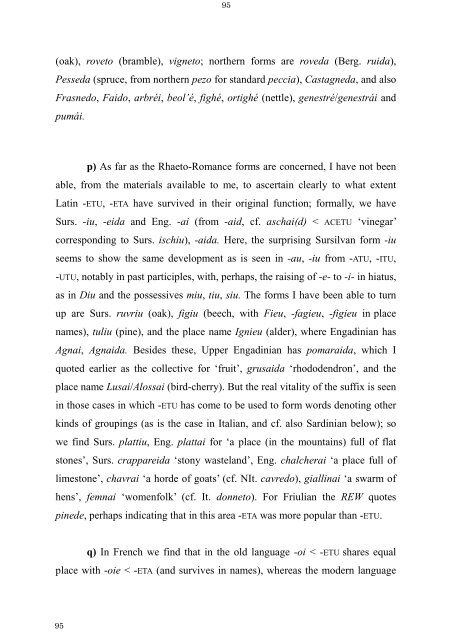The Latin Neuter Plurals in Romance - Page ON
The Latin Neuter Plurals in Romance - Page ON
The Latin Neuter Plurals in Romance - Page ON
You also want an ePaper? Increase the reach of your titles
YUMPU automatically turns print PDFs into web optimized ePapers that Google loves.
95<br />
95<br />
(oak), roveto (bramble), vigneto; northern forms are roveda (Berg. ruida),<br />
Pesseda (spruce, from northern pezo for standard peccia), Castagneda, and also<br />
Frasnedo, Faido, arbréi, beol’é, fighé, ortighé (nettle), genestré/genestrái and<br />
pumái.<br />
p) As far as the Rhaeto-<strong>Romance</strong> forms are concerned, I have not been<br />
able, from the materials available to me, to ascerta<strong>in</strong> clearly to what extent<br />
<strong>Lat<strong>in</strong></strong> -ETU, -ETA have survived <strong>in</strong> their orig<strong>in</strong>al function; formally, we have<br />
Surs. -iu, -eida and Eng. -ai (from -aid, cf. aschai(d) < ACETU ‘v<strong>in</strong>egar’<br />
correspond<strong>in</strong>g to Surs. ischiu), -aida. Here, the surpris<strong>in</strong>g Sursilvan form -iu<br />
seems to show the same development as is seen <strong>in</strong> -au, -iu from -ATU, -ITU,<br />
-UTU, notably <strong>in</strong> past participles, with, perhaps, the rais<strong>in</strong>g of -e- to -i- <strong>in</strong> hiatus,<br />
as <strong>in</strong> Diu and the possessives miu, tiu, siu. <strong>The</strong> forms I have been able to turn<br />
up are Surs. ruvriu (oak), figiu (beech, with Fieu, -fagieu, -figieu <strong>in</strong> place<br />
names), tuliu (p<strong>in</strong>e), and the place name Ignieu (alder), where Engad<strong>in</strong>ian has<br />
Agnai, Agnaida. Besides these, Upper Engad<strong>in</strong>ian has pomaraida, which I<br />
quoted earlier as the collective for ‘fruit’, grusaida ‘rhododendron’, and the<br />
place name Lusai/Alossai (bird-cherry). But the real vitality of the suffix is seen<br />
<strong>in</strong> those cases <strong>in</strong> which -ETU has come to be used to form words denot<strong>in</strong>g other<br />
k<strong>in</strong>ds of group<strong>in</strong>gs (as is the case <strong>in</strong> Italian, and cf. also Sard<strong>in</strong>ian below); so<br />
we f<strong>in</strong>d Surs. plattiu, Eng. plattai for ‘a place (<strong>in</strong> the mounta<strong>in</strong>s) full of flat<br />
stones’, Surs. crappareida ‘stony wasteland’, Eng. chalcherai ‘a place full of<br />
limestone’, chavrai ‘a horde of goats’ (cf. NIt. cavredo), giall<strong>in</strong>ai ‘a swarm of<br />
hens’, femnai ‘womenfolk’ (cf. It. donneto). For Friulian the REW quotes<br />
p<strong>in</strong>ede, perhaps <strong>in</strong>dicat<strong>in</strong>g that <strong>in</strong> this area -ETA was more popular than -ETU.<br />
q) In French we f<strong>in</strong>d that <strong>in</strong> the old language -oi < -ETU shares equal<br />
place with -oie < -ETA (and survives <strong>in</strong> names), whereas the modern language









